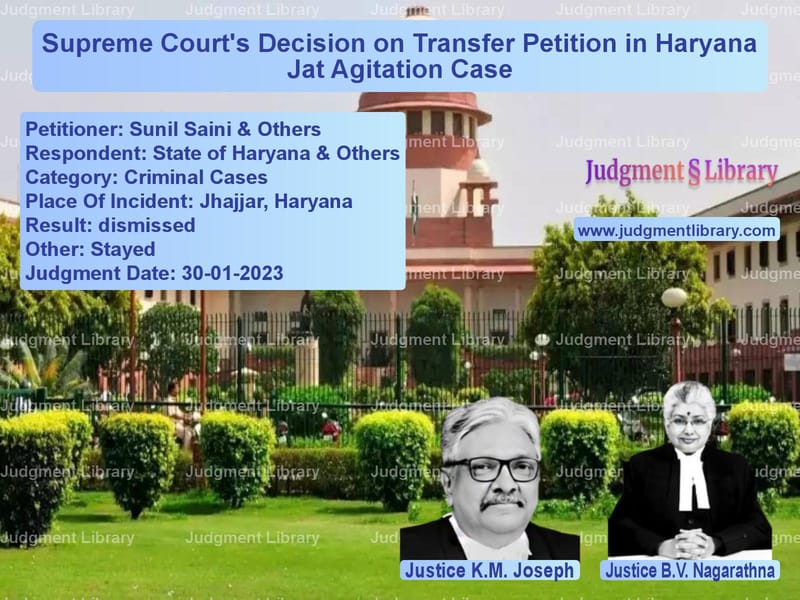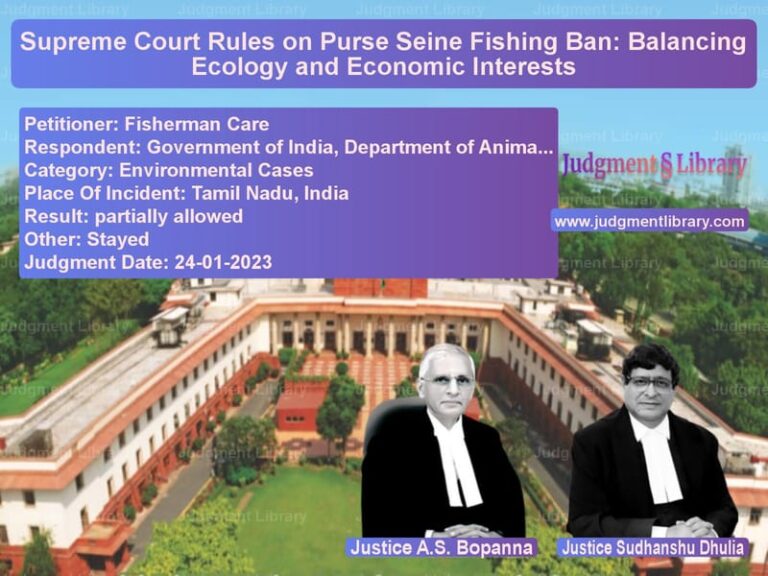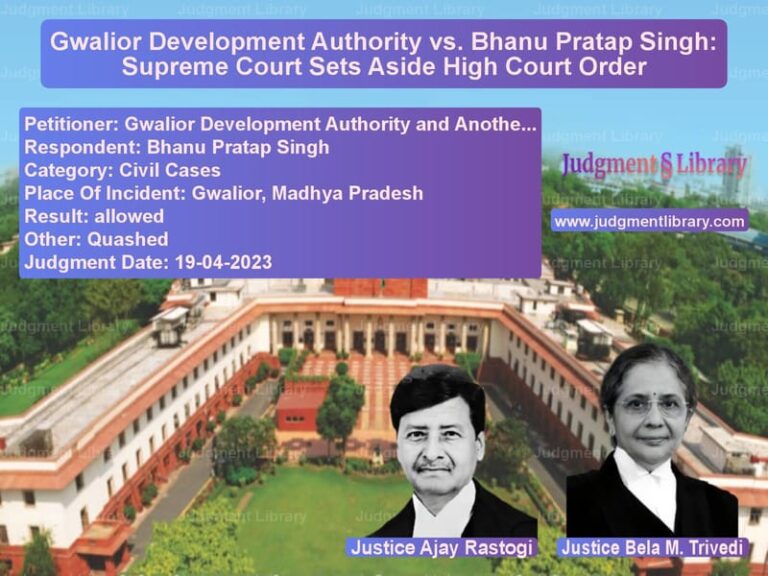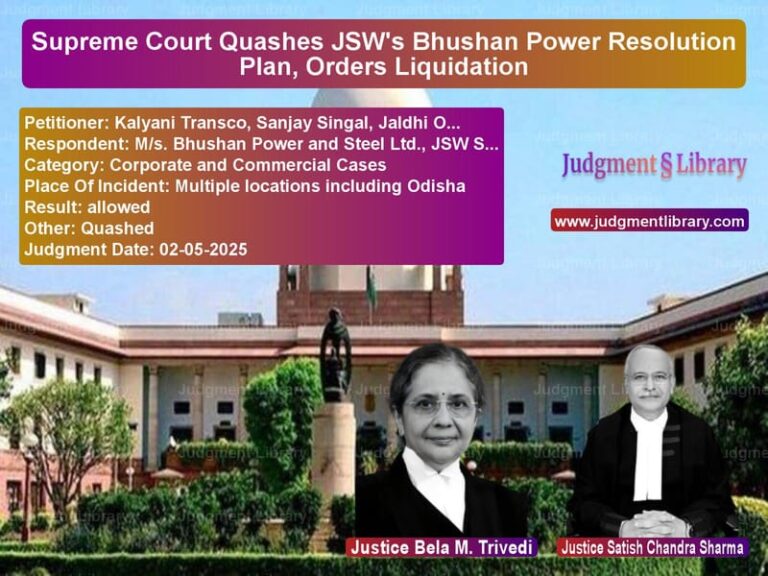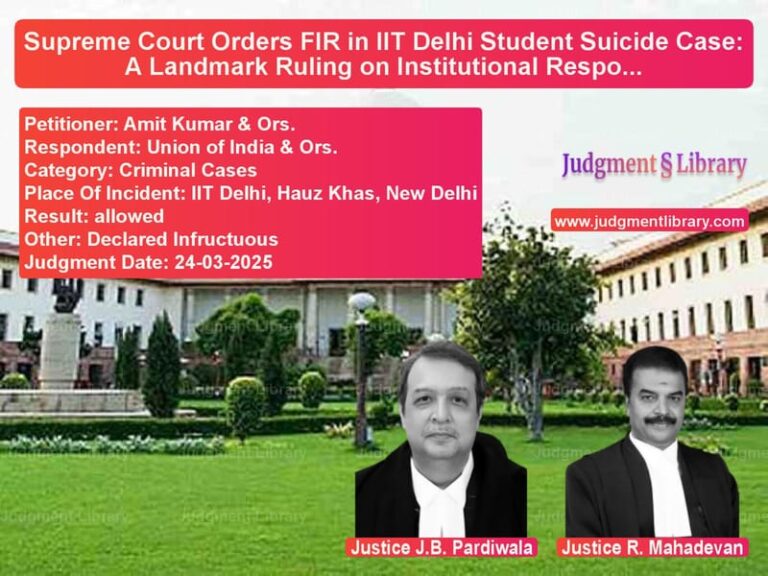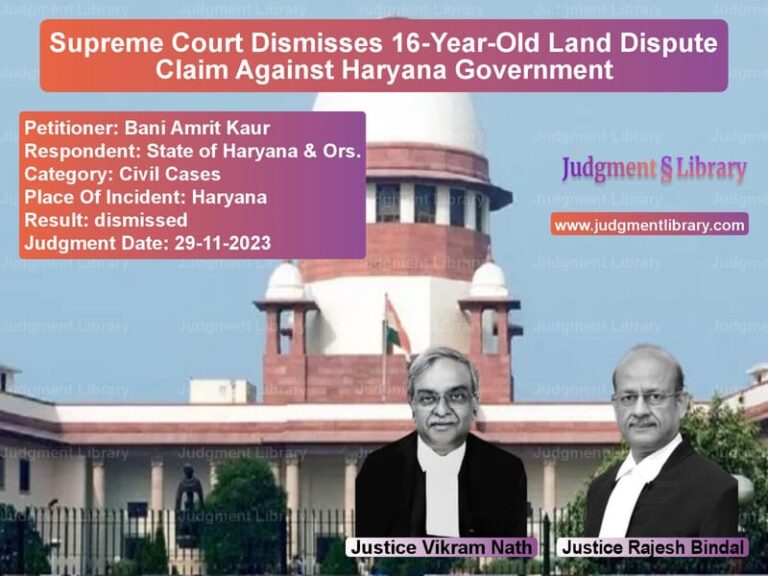Supreme Court’s Decision on Transfer Petition in Haryana Jat Agitation Case
The Supreme Court of India recently delivered a judgment in the case of Sunil Saini & Others vs. State of Haryana & Others. This case revolved around the request to transfer a criminal trial arising from the 2016 Haryana Jat Reservation Agitation. The petitioners sought the transfer of the case from the Additional Sessions Judge, Jhajjar, to a competent court in New Delhi, citing concerns over an unfair trial due to alleged local influence and witness intimidation.
Background of the Case
The case originated from an agitation carried out by members of the Jat community in Haryana in 2016. The protest aimed to secure reservation benefits in government jobs and educational institutions. However, it escalated into widespread violence, with reported incidents of vandalism, arson, and destruction of properties.
The petitioners claimed they suffered extensive losses, as their houses, godowns, and belongings were set on fire. They alleged that a senior advocate, who had served as the Bar Association President, influenced the proceedings to protect the accused. As a result, key witnesses turned hostile, and crucial documentary evidence was withheld.
The petitioners had filed an application under Section 319 of the Criminal Procedure Code (CrPC) to summon the said advocate and his son as additional accused. However, their application was rejected as it lacked the public prosecutor’s countersignature, prompting them to seek relief from the Supreme Court.
Arguments by the Petitioners
- The accused were politically and socially influential, which hindered the fair trial process.
- Two to three material witnesses turned hostile due to intimidation.
- The case involved large-scale violence resulting in deaths and destruction, warranting judicial scrutiny at a neutral location.
- The public prosecutor and local authorities were allegedly biased, failing to act fearlessly in prosecuting the accused.
- The rejection of their Section 319 CrPC application prevented the inclusion of key suspects, further weakening their case.
- They requested the transfer of the case to New Delhi, citing a lack of faith in the Haryana judiciary.
Arguments by the Respondents
- The prosecution had already examined 42 witnesses, and transferring the case at this stage would be impractical.
- The newly appointed special public prosecutor had extensive experience, having handled over 500 cases, including murder and honor killings.
- The state had a Witness Protection Scheme, 2018, which allowed witnesses to seek protection from the judiciary or the police.
- The High Court had already upheld the rejection of the Section 319 CrPC application.
- The allegations of bias against the prosecution were baseless and lacked evidence.
Supreme Court’s Observations
- “The State exists on the basis of implied consent of the governed. The principal reason for people to come together under the organization of the state is the fundamental principle that the State will be in a position to always protect the lives and properties of the citizens.”
- “Rule of law is rightfully treated as part of the basic structure of the Constitution. It is the bounden duty of any State to ensure that the lives of its citizens and other persons are at all times protected.”
- “The principal mechanism for vindicating the rule of law and upholding the rights of the citizens is the judicial branch of the State.”
- “One of the fundamental methods by which rule of law is preserved consists of sanctions of which criminal law is the principal branch.”
- “The criminal courts must be allowed to function in a manner by which at the end of the day the guilty are punished and the innocent are exonerated.”
- “The role of the Public Prosecutor in all of this is paramount. He is duty-bound to always act in a fair manner, not to secure conviction by hook or crook but to fearlessly adduce evidence so that those who are guilty do not get away scot-free.”
The Supreme Court acknowledged the petitioners’ concerns but noted that, given the passage of time and the fact that 42 witnesses had already been examined, transferring the case at this stage was not feasible.
Final Judgment
- The Supreme Court denied the transfer request but issued specific directions to ensure fairness in the trial.
- The petitioners were granted the liberty to approach the Director of Prosecution if they believed the special public prosecutor was not acting impartially.
- The state authorities were directed to provide protection to witnesses under the Witness Protection Scheme, 2018.
- The Court emphasized that the public prosecutor must act fearlessly to uphold justice.
- It clarified that its observations should not influence the trial court’s findings, which must be based solely on evidence and law.
Legal Precedents Considered
- State of Maharashtra vs. Praful Desai (2003): Reinforced that trials must be fair and impartial, ensuring witness security.
- Swaran Singh vs. State of Punjab (2000): Highlighted the importance of protecting witnesses from intimidation.
- Maneka Gandhi vs. Union of India (1978): Reaffirmed that justice must not only be done but must be seen to be done.
Implications of the Judgment
- The ruling reaffirms the importance of fair trials, especially in cases involving political or social influence.
- It reinforces the role of public prosecutors in ensuring justice without bias or pressure.
- It highlights the judiciary’s responsibility in addressing witness intimidation and protecting victims.
- The case sets a precedent for addressing trial transfer requests, balancing concerns of fairness with judicial efficiency.
Conclusion
The Supreme Court’s decision in this case reflects a careful balance between judicial intervention and procedural efficiency. While the Court denied the transfer request, it ensured that necessary safeguards were in place to protect the integrity of the trial. The ruling underscores the judiciary’s role in upholding the rule of law and ensuring that justice is not compromised due to external influences. The emphasis on the public prosecutor’s responsibility further strengthens the commitment to fair trial principles, ensuring that both the guilty are punished and the innocent are protected.
Read also: https://judgmentlibrary.com/dying-declaration-in-dowry-death-case-supreme-court-acquits-husband/
Petitioner Name: Sunil Saini & Others.Respondent Name: State of Haryana & Others.Judgment By: Justice K.M. Joseph, Justice B.V. Nagarathna.Place Of Incident: Jhajjar, Haryana.Judgment Date: 30-01-2023.
Don’t miss out on the full details! Download the complete judgment in PDF format below and gain valuable insights instantly!
Download Judgment: sunil-saini-&-others-vs-state-of-haryana-&-o-supreme-court-of-india-judgment-dated-30-01-2023.pdf
Directly Download Judgment: Directly download this Judgment
See all petitions in Bail and Anticipatory Bail
See all petitions in Custodial Deaths and Police Misconduct
See all petitions in Judgment by K.M. Joseph
See all petitions in Judgment by B.V. Nagarathna
See all petitions in dismissed
See all petitions in Stayed
See all petitions in supreme court of India judgments January 2023
See all petitions in 2023 judgments
See all posts in Criminal Cases Category
See all allowed petitions in Criminal Cases Category
See all Dismissed petitions in Criminal Cases Category
See all partially allowed petitions in Criminal Cases Category

